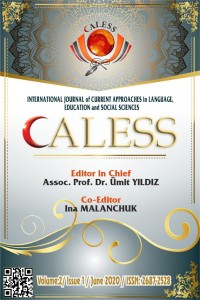Araştırma Makalesi
Yıl 2020,
Cilt: 2 Sayı: 1, 413 - 424, 28.06.2020
Öz
Kaynakça
- 1. Ferreira, N.S.C., et al. (2014) Educational Technology and Educational Management in the Higher Education: New Ways of Forming Professionals. Open Journal of Social Sciences. Vol. 2, 7-11.
- 2. Mirabile, R.J. (1997). Everything you wanted to know about competency modeling. Training and development, 73-77.
- 3.Halupa, C.P. (2015), Pedagogy Andragogy and Heutagogy. In book: Transformative Curriculum Design in Health Sciences Education, 143-158. Retrieved at http://agelesslearner.com/intros/ andragogy.html
- 4. 1st UNESCO Global Forum on International Quality Assurance, Accreditation and the Recognition of Qualifications in Higher Education. Paris, 18-19 Oct, 2002.
- 5. McKenzie, J. (2001). How Teachers Learn Technology Best. The Educational Technology Journal. Vol. 10, (6), Retrieved at http://www.fno.org/mar01/howlearn.html
- 6. Peccei, A. (1977) The Human Quality. Oxford; New York: Pergamon Press, 220
- 7. Gore, J., et al. (2017). Effects of professional development on the quality of teaching: Results from a randomised controlled trial of Quality Teaching Rounds. Teaching and Teacher Education. Vol. 68, 99-113.
Yıl 2020,
Cilt: 2 Sayı: 1, 413 - 424, 28.06.2020
Öz
The article analyzes the trends and processes occurring in the adult education system. The research is based on the synergy-andragogical and competence approaches. The features of the content, principles and technologies of adult education are determined. The „adult concept“ comprises the ability to self-determination, a certain level of various competencies, responsible position and behavior. The investigation on adult education issues (Knowles & Swanson, 2005; Kolb, 1984; Jarvis, 2004) determines the theoretical and methodological foundations of andragogy, adult education technology, management and organizational aspects of the design of the educational process. One of the models of arranging the adult learning process is the introduction of professionally oriented technologies aimed at qualitative changes in the education system, at mastering students’ professional and communicative competence. Humanistic and cultural approaches are supposed to be fundamental psychological theses.
Anahtar Kelimeler
competence approach andragogy adult education technology professionally oriented skills and competencies
Kaynakça
- 1. Ferreira, N.S.C., et al. (2014) Educational Technology and Educational Management in the Higher Education: New Ways of Forming Professionals. Open Journal of Social Sciences. Vol. 2, 7-11.
- 2. Mirabile, R.J. (1997). Everything you wanted to know about competency modeling. Training and development, 73-77.
- 3.Halupa, C.P. (2015), Pedagogy Andragogy and Heutagogy. In book: Transformative Curriculum Design in Health Sciences Education, 143-158. Retrieved at http://agelesslearner.com/intros/ andragogy.html
- 4. 1st UNESCO Global Forum on International Quality Assurance, Accreditation and the Recognition of Qualifications in Higher Education. Paris, 18-19 Oct, 2002.
- 5. McKenzie, J. (2001). How Teachers Learn Technology Best. The Educational Technology Journal. Vol. 10, (6), Retrieved at http://www.fno.org/mar01/howlearn.html
- 6. Peccei, A. (1977) The Human Quality. Oxford; New York: Pergamon Press, 220
- 7. Gore, J., et al. (2017). Effects of professional development on the quality of teaching: Results from a randomised controlled trial of Quality Teaching Rounds. Teaching and Teacher Education. Vol. 68, 99-113.
Toplam 7 adet kaynakça vardır.
Ayrıntılar
| Birincil Dil | İngilizce |
|---|---|
| Konular | Alan Eğitimleri |
| Bölüm | Araştırma Makaleleri |
| Yazarlar | |
| Yayımlanma Tarihi | 28 Haziran 2020 |
| Yayımlandığı Sayı | Yıl 2020 Cilt: 2 Sayı: 1 |
calessjournal@gmail.com https://dergipark.org.tr/en/pub/caless


